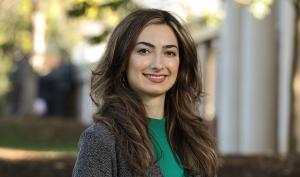
The National Institutes of Health announced today that Natasha Sheybani, assistant professor in the University of Virginia School of Engineering and Applied Science’s Department of Biomedical Engineering, is the recipient of the prestigious NIH Director’s Early Independence Award.
The award is given to outstanding junior scientists who have the intellect, scientific creativity, drive and maturity to bypass the traditional postdoctoral training period — which typically lasts three to five years — and immediately launch independent research careers.
That means Sheybani, who started a postdoctoral fellowship at Stanford University late last year, is returning to UVA Engineering this fall with her own research lab and a new role on the faculty. She is the first-ever UVA recipient of this award.
Sheybani named to Forbes' 30 Under 30 in Science.
The Early Independence Award was established in 2011 and is part of the NIH’s High-Risk, High-Reward Research program, which supports scientists who are pursuing innovative research that has the potential for a broad impact in biomedical, behavioral or social sciences.
The award will provide Sheybani with $250,000 in direct research costs annually for up to five years to support the establishment of her lab, which will explore non-invasive paradigms for advancing precision immunotherapy in solid cancers using focused ultrasound and quantitative imaging.
“UVA, including the Biomedical Engineering Department, is a world leader in focused ultrasound therapy, and Dr. Sheybani will markedly expand our preclinical and clinical impact in this area,” said Frederick Epstein, professor and chair of biomedical engineering. “She will bring new expertise in applying radiogenomics and liquid biopsy to cancer diagnosis and therapy. Notably, these skills will synergize exceptionally well with UVA’s ongoing ‘first-in-the-world’ clinical trials combining focused ultrasound with immunotherapies.”
As a biomedical engineering graduate student in professor Richard Price’s lab, which is known for the use of image-guided focused ultrasound for targeted drug and gene delivery, Sheybani’s research centered on understanding how focused ultrasound regimens influence the immune system and deliver immunotherapies where they need to go, especially with regard to breast cancer and certain types of brain cancers.
“I’m most pleased to say that the work we ended up doing in metastatic breast cancer has since been translated into a clinical trial that’s now ongoing at UVA,” she said.
In 2018, Sheybani received a coveted F99/K00 Predoctoral to Postdoctoral Fellow Transition Award by the NIH National Cancer Institute. The award is intended to aid students who aspire to start an independent cancer research lab.
And for her work on focused ultrasound in Price’s lab, the health news website STAT named Sheybani a “Wunderkind” in 2020 as part of an annual competition that highlights the great work of young scientists. She was one of just 26 scientists to earn this recognition nationally.
As she settles into her new position at UVA, Sheybani doesn’t plan on slowing down anytime soon and is eager to begin research in her lab.
“My ambitions are underscored by an urgent desire to save and transform human lives through biomedical research,” she said. “Going forward, I still have so many big dreams, and this award feels like a launching pad propelling me toward them.”